Complete Solutions to Taking it together of chapter CENTRE OF MASS of Class 11 book with complete answers and questions
| Class 11 | PHYSICS |
| Chapter | CENTRE OF MASS |
| DC PANDEY NEET | Taking it together |
| Number Of Questions | 73 |
| Academic Year | 2023-24 |
A bullet of mass a and velocity b is fired into a large block of mass c. The final velocity of the system is
01:37View SolutionA bullet of mass 5 g is fired at a velocity of `900 ms^(-1)` from a rifle of mass 2.5 kg. What is the recoil velocity of the rifle.?
02:10View SolutionA body of mass a moving with a velocity b strikes a body of mass c and gets embered into it. The velocity of the systems after collision is
02:00View SolutionTwo trains A and B are running in the same direction on the parallel rails such that A is faster than B. Packets of equal weight are transferred from A to B. What will happen due to this :
04:25View SolutionIn a two block system an initial velocity `v_(0)` with respect to ground is given to block A
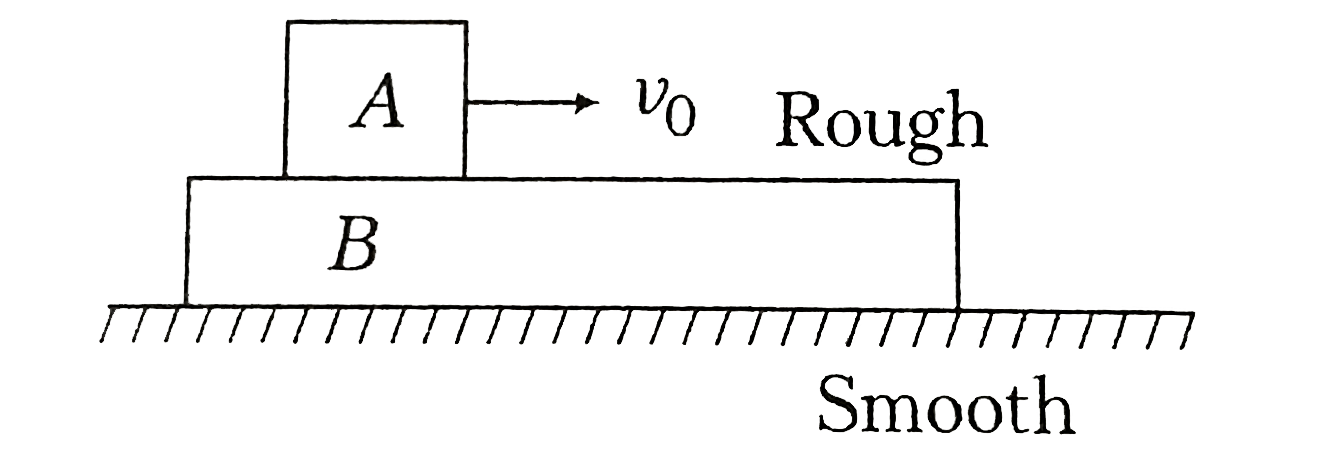 02:46View Solution
02:46View SolutionIf the net external forces acting on the system oif particles is zero, then which of the following may vary?
06:47View SolutionThe bob `A` of a simple pendulum is released when the string makes an angle of `45^(@)` with the vertical. It hits another bob `B` of the same material and same mass kept at rest on the table. If the collision is elastic, then
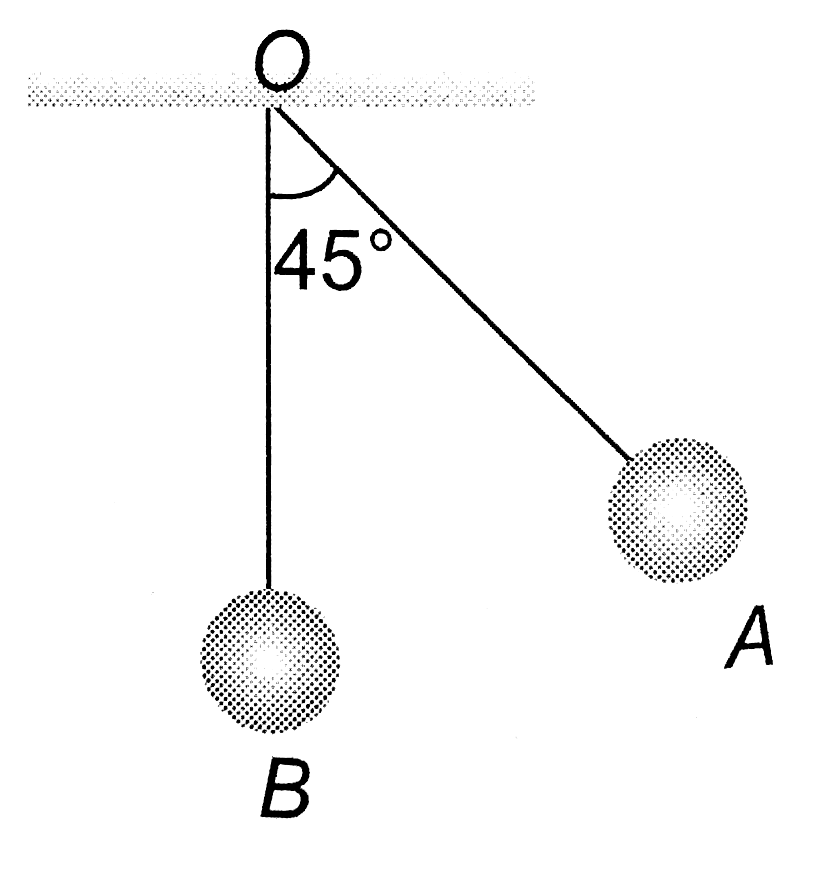 02:15View Solution
02:15View SolutionConsider the following two statements:
A. linear momentum of the system remains constant.
B. Centre of mass of the system remains at rest02:02View SolutionConsider the following two statements:
A. Linear momentum of a system of partcles is zero.
B. Kinetic energ of a system of particles is zero.03:05View SolutionA particle of mass m has momentum p. Its kinetic energy will be
01:37View SolutionA particle is projected from a point of an angle with the horizontal. At any instant t, if p is the linear momentum and E the kinetic energy, then which of the following graph is/are correct?
01:43View SolutionA block of mass `m` at rest is acted upon by a force `F` for a time t. The kinetic energy of block after time t is
03:42View SolutionA 'T' shaped object with dimensions shown in the figure, is lying on a smooth floor. A force `'vecF'` is applied at the point P parallel to AB, such that the object has only the translational motion without rotation. Find the location of P with respect C.
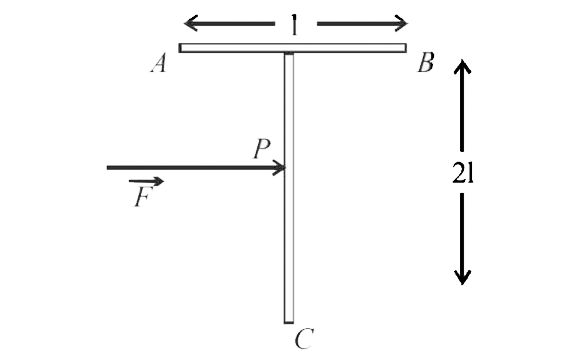 04:18View Solution
04:18View SolutionA cricket ball of mass `150g` moving with a speed of `126km//h` hits at the middle of the bat, held firmly at its position by the batman. The ball moves straight back to the bowler after hitting the bat. Assuming that collision between ball and bat is completely elastic and the two remain in contact for `0.001s`, the force that the batsman had to apply to hold the bat firmly at its place would be
06:01View SolutionTwo identical ball bearings in contact with each other and resting on a frictionless table are hit heat-on by another ball bearing of the same mass moving initially with a speed `V` as shown in figure.
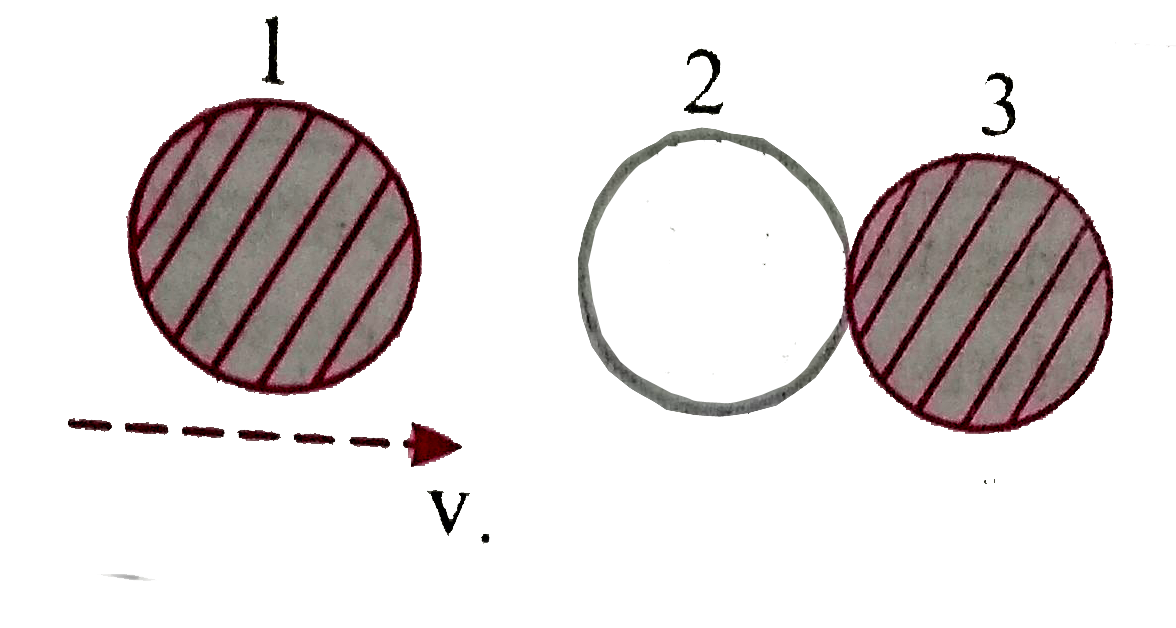
If the collision is elastic, which of the following (figure) is a possible result after collision ?03:29View SolutionDuring inelastic collision between two bodies, which of the following quantities always remain conserved ?
01:39View SolutionConservation of momentum in a collision beween particles can be understood form
01:40View SolutionFor which of the following does the centre of mass lie outside the body ?
01:58View SolutionWhich of the following points is the likely position of the centre of mass of the system shown in Fig.
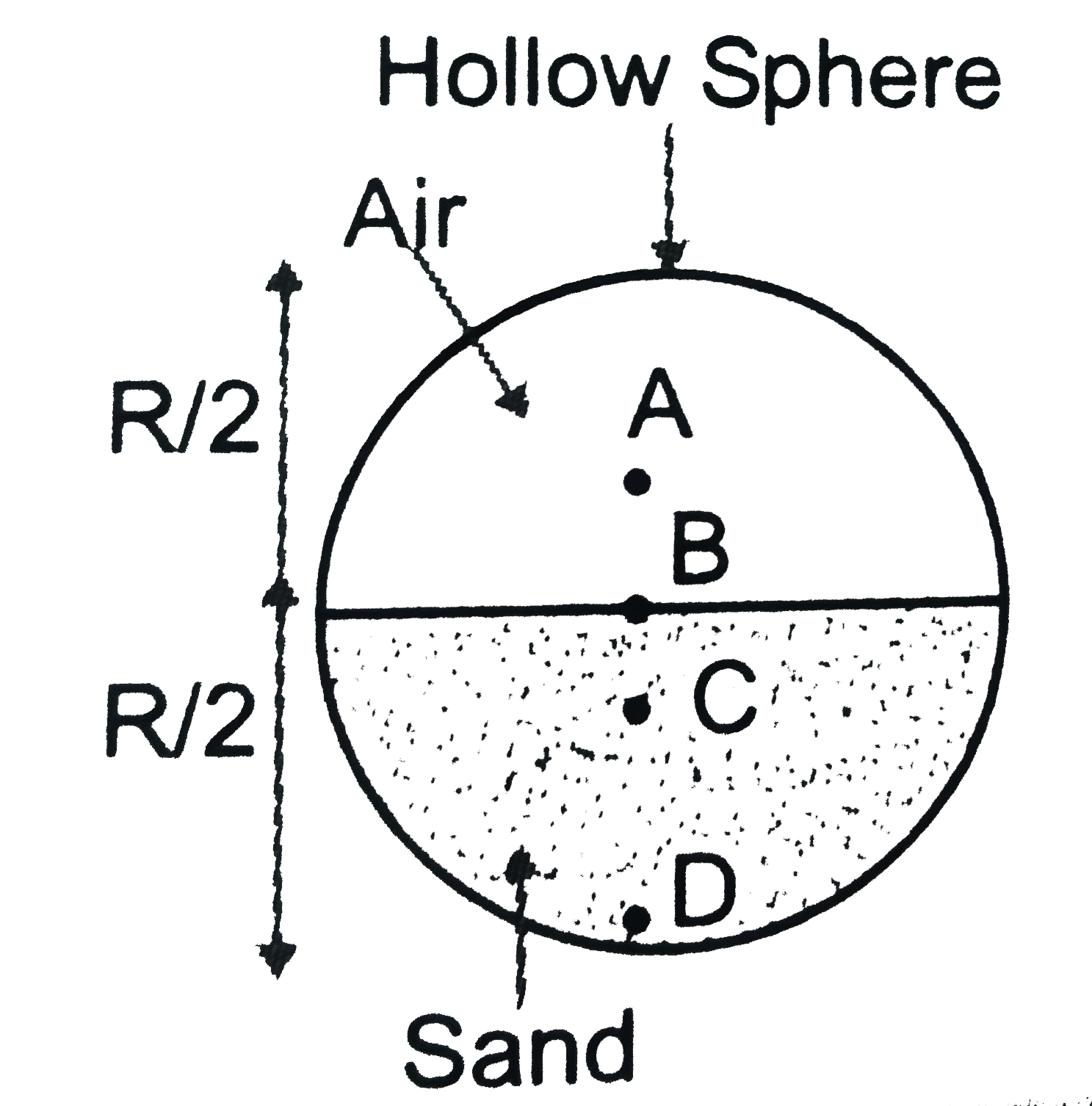 02:35View Solution
02:35View SolutionA cannot ball is fired with a velocity 200m / sec at an angle of 60° with the horizontal. At the highest point of its flight it explodes into 3 equal fragments, one going vertically upwards with a velocity 100 m / sec , the second one falling vertically downwards with a velocity 100 m / sec . The third fragment will be moving with a velocity
04:46View SolutionA particle of mass m moving with velocity u makes an elastic one-dimentional collision with a stationary particle of mass `m`. They come in contact for a very small time `t_0`. Their force of interaction increases from zero to `F_0` linearly in time `0.5t_0`, and decreases linearly to zero in further time `0.5t_0` as shown in figure. The magnitude of `F_0` is
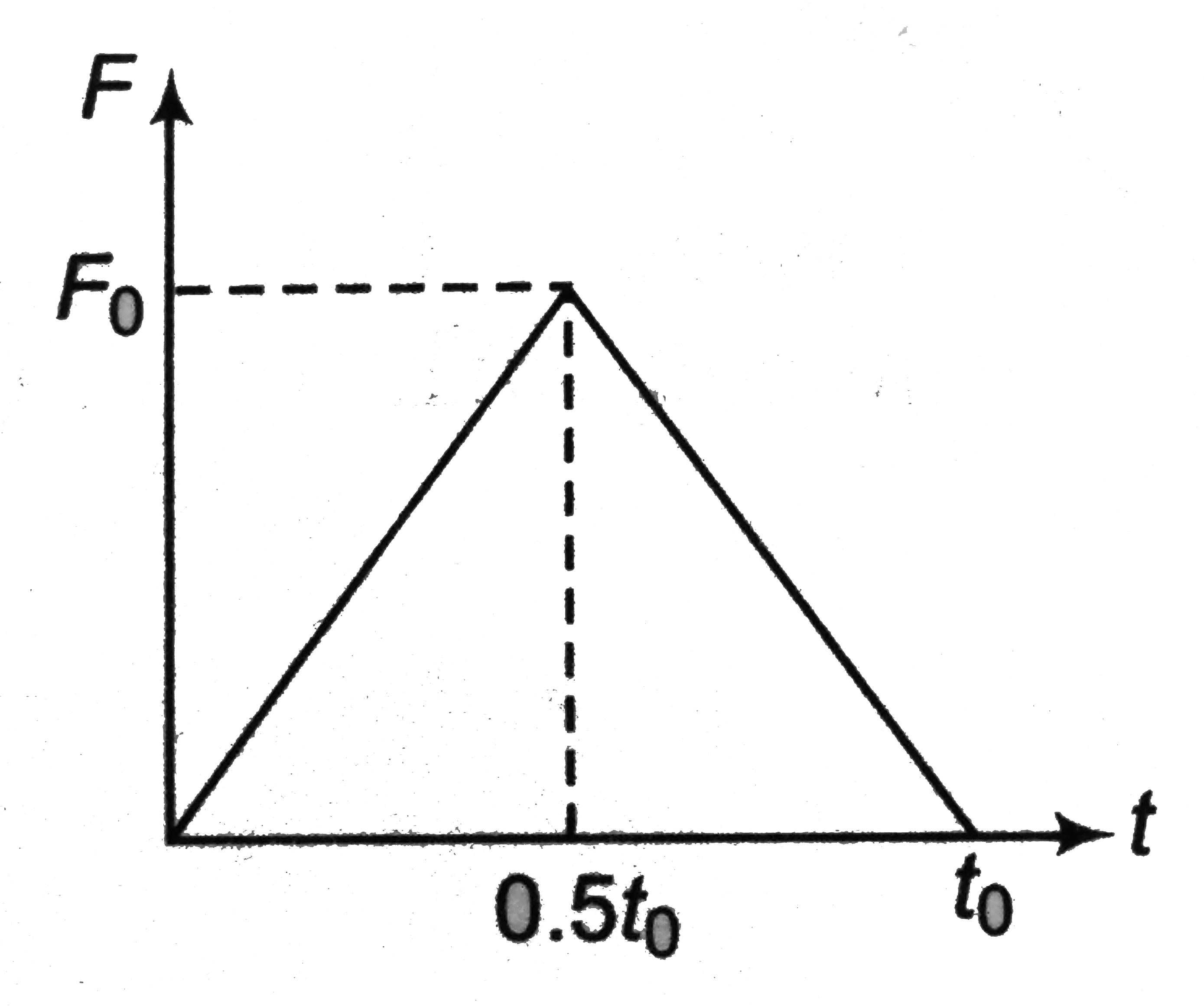 03:52View Solution
03:52View SolutionTwo balls of equal mass have a head on collisino with speed `4ms^(-1)` each travelling in opposite direction. If the coefficient's of resolution is `1/2`, the speed of each ball after impact will be
02:19View SolutionA metal ball falls from a height of 32 metre on a steel plate. If the coefficient of restitution is 0.5, to what height will the ball rise after second bounce
06:15View SolutionA mass m with velocity u strikes a wall normally and returns with same speed. What is the magnitude of the change in momentum of the body when it returns.
01:30View SolutionA projectile of mass `m` is fired with a velocity `v` from point P at an angle `45^@`. Neglecting air resistance, the magnitude of the change in momentum leaving the point P and arriving at Q is
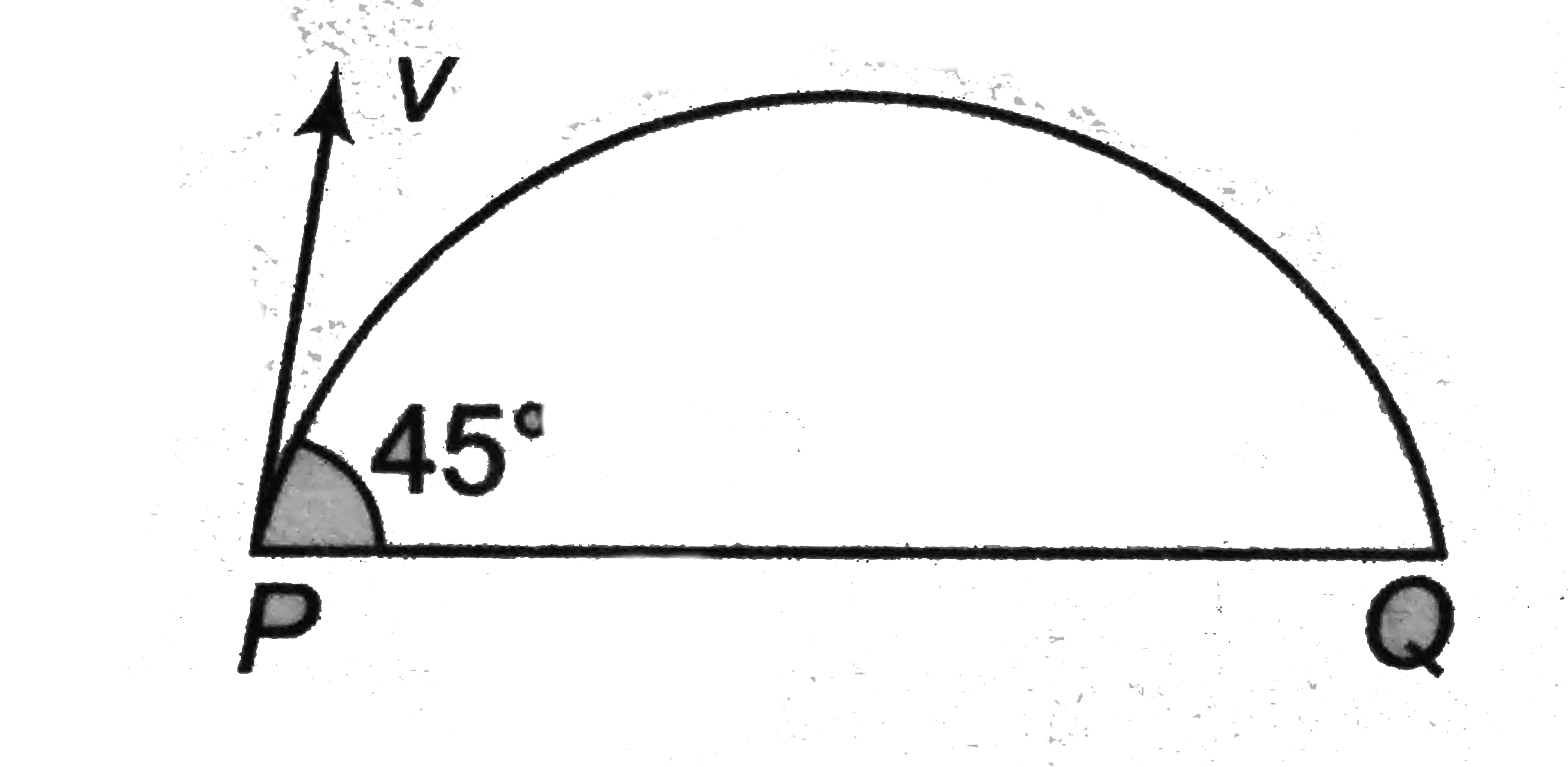 02:34View Solution
02:34View SolutionA machine gun fires a steady stream of bullets at the rate of n per minute into a stationary target in which the bullets get embedded. If each bullet has a mass m and arrives at the target with a velocity v, the average force on the target is
01:32View Solution10,000 small balls, each weighing 1 gm , strike one square cm of area per second with a velocity 100 m/s in a normal direction and rebound with the same velocity. The value of pressure on the surface will be
03:22View SolutionA block C of mass m is moving with velocity `v_(0)` and collides elastically with block A of mass m and connected to another block B of mass `2m` through spring constant k. What is k if `x_(0)` is compression of spring when velocity of A and B is same?
 08:54View Solution
08:54View SolutionA bullet of mass m is fired into a block of wood of mass M which hangs on the end of pendulum and gets embedded into it. When the bullet strikes with maximum rise R. Then, the velocity of the bullet is given by
02:48View SolutionA particle of mass `m` moving with a speed `v` hits elastically another staionary particle of mass `2m` on a smooth horizontal circular tube of radius `r`. Find the time when the next collision will take place?
05:40View SolutionA bullet of mass `20 g` and moving with `600 m/s` collides with a block of mass `4 kg` hanging with the string. What is the velocity of bullet when it comes out of block, if block rises to height `0.2 m` after collision?
04:13View SolutionA bomb of `1kg` is thrown vertically up with speed `100m//s` After 5 seconds it explodes into two parts. One part of mass `400gm` goes down with speed `25m//s` What will happen to the other part just after explosion .
02:28View SolutionA ball after freely falling from a height of `4.9m` strikes a horizontal plane. If the coefficient of restitution is `3/4`, the ball will strike second time with the plane after
03:04View SolutionA dise of mass 10 g is kept floating horizontally by throwing 10 marbles per secound against it from below . If mass of each marble is 5 g Calculate the velocity with which marbles are striking the disc . Assume that marbles strike the disc . Normally and rebound downwards with the same speed.
03:49View SolutionA machine gun fires a bullet of mass 40 g with a velocity `1200 ms^-1`. The man holding it can exert a maximum force of 144 N on the gun. How many bullets can be fire per second at the most?
03:56View SolutionA straight rod of length L has one of its end at the origin and the other at `X=L`. If the mass per unit length of the rod is given by `Ax` where A is constant, where is its centre of mass?
02:54View SolutionIn a one-dimensional collision between two identical particles. A and B, B is stationary and A has momentum `p` before impact. During impact, B gives an impulse J to A. Find the coefficient of restitution between A and B?
03:58View SolutionA partical of mass `'m'` moving with a velocity `(3 hat(i)+2hat(j))m//s` collides with statinary mass `'M'` and finally `'m'` moves with a velocity `(-2hat(i)+hat(j))m//s` if `(m)/(M) = (1)/(13)` the velocity of the `M` after collision is?
03:06View SolutionA mass of 10 gm moving with a velocity of 100 cm / s strikes a pendulum bob of mass 10 gm . The two masses stick together. The maximum height reached by the system now is `(g=10m//s^(2))`
03:52View SolutionBoth the blocks as shown in figure are given together a horizontal velocity towards right. The acceleration of the centre of mass of the system of block is `(m_(A) = 2m_(B) = 2kg)`.
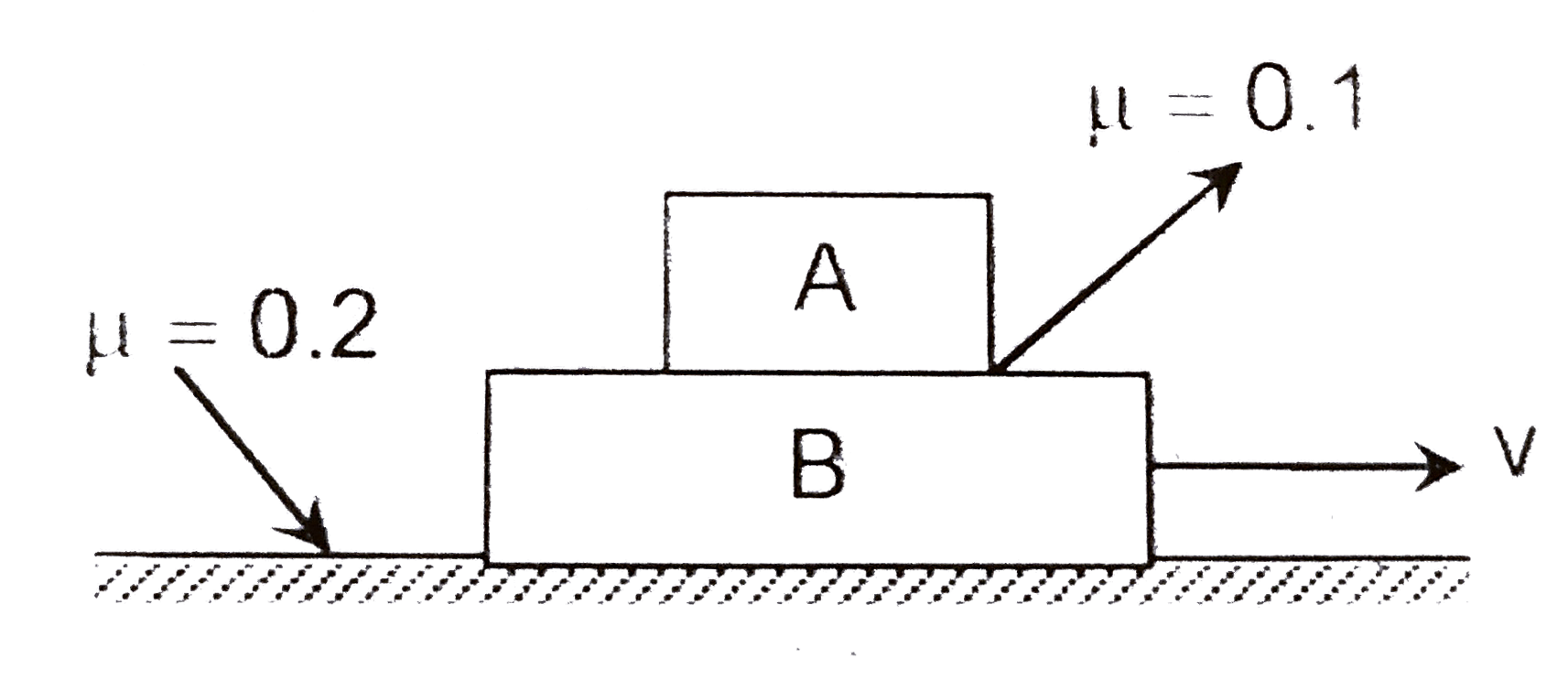 02:58View Solution
02:58View SolutionA ladder is leaned against a smooth wall and it is allowed to slip on a frictionless floor. Which figure represents the track of its centre of mass ?
04:35View SolutionA circular plate of diameter d is kept in contact with a square plate of edge d as shown in figure. The densit of the material and the thickness are same
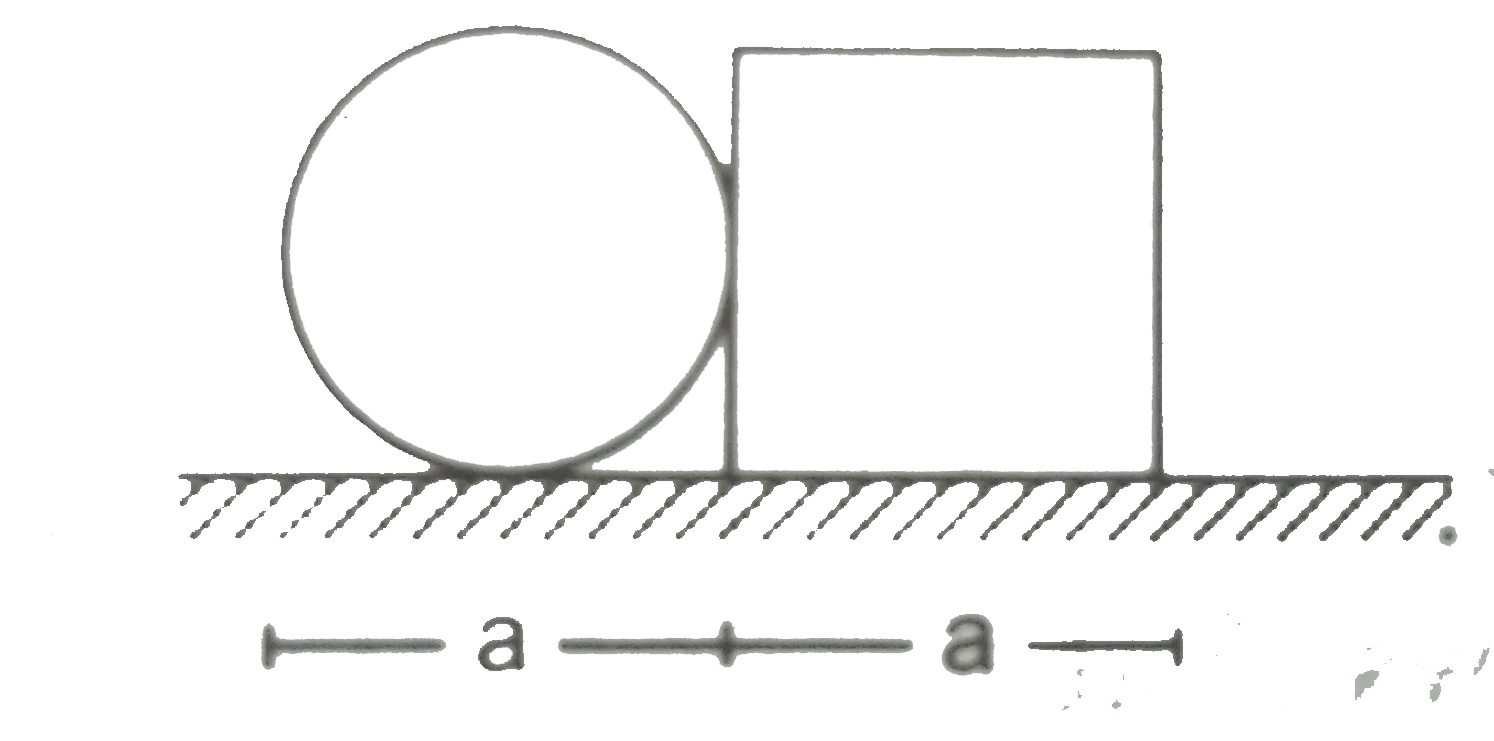 . Everywhere. The centre of mass of the composite system will be 05:08View Solution
. Everywhere. The centre of mass of the composite system will be 05:08View SolutionA circular ring of mass 6kg and radius a is placed such that its center of lies at the origin. Two particles of masses 2 kg each are placed at the intersecting points of the circle with positive X-axis and positive Y-axis. Then, the angle made by the position vector of center of mass of entire system with X-axis is
02:44View SolutionIn a gravity free space, man of mass `M` standing at a height `h` above the floor, throws a ball of mass `m` straight down with a speed `u`. When the ball reaches the floor, the distance of the man above the floor will be.
02:45View SolutionA ball falls freely from a height of 45m. When the ball is at a height of 25m, it explodes into two equal piece. One of them moves horizontally with a speed of `10ms^(-1)`. The distance between the two pieces on the ground is
08:02View SolutionTwo blocks of msses 10 kg and 30 kg are placed along a vertical line. The first block is raised through a height of 7 cm. By what distance should the second mass be moved to raise the centre of mass by 1 cm?
02:38View SolutionIn a free space a rifle on mass `M` shoots a bullet of mass `m` at a stationary block of mass `M` distance `D` away from it . When the bullet has moved through a distance `d` towards the block the centre of mass of the bullet `-` block system is at a distance of `:`
05:59View SolutionA cracker is thrown into air with a velocity of `10 m//s` at an angle of `45^(@)` with the vertical. When it is at a height of `0.5 m` from the ground, it explodes into a number of pieces which follow different parabolic paths. What is the velocity of centre of mass, when it is at a height of `1 m` from the ground? (`g = 10 m//s^(2)`)
01:42View SolutionA 2 kg block of wood rests on a long table top. A 5 g bullet moving horizontally with a speed of `150 ms^(-1)` is shot into the block and sticks to it. The block then slides 2.7m along the table top and comes to a stop. The force of friction between the block and the table is
03:21View SolutionIf kinetic energy of a body is increased by 300%, then percentage change in momentum will be
02:48View SolutionIf the linear momentum is increased by 50%, then KE will be increased by :
03:12View SolutionIf the kinetic energy of a body increases by `0.1 %` the percent increase of its momentum will be
02:47View SolutionA bullet moving with a speed of `100 ms^(-1)` can just penetrate into two planks of equal thickness. Then the number of such planks, if speed is doubled will be .
02:28View SolutionA ball is projected vertically down with an initial velocity from a height of `20 m` onto a horizontal floor. During the impact it loses `50%` of its energy and rebounds to the same height. The initial velocity of its projection is
05:46View SolutionA ball of mass mis released from the top of an inclined plane of inclination `theta` as shown. It strikes a rigid surface at at a distance `(3l)/(4)` from top elastically. Impulse imparted to ball by the rigid surface is
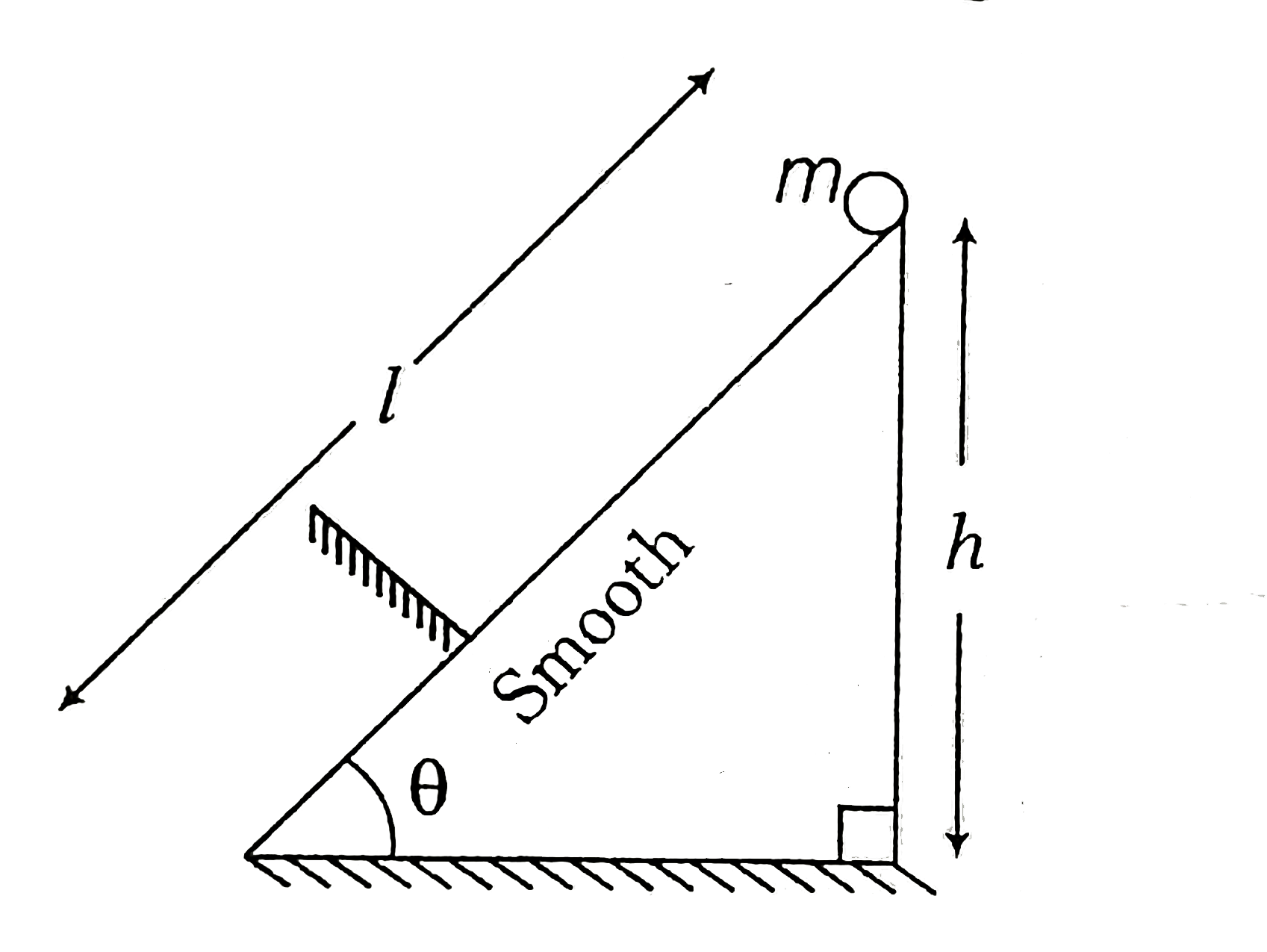 03:29View Solution
03:29View SolutionTwo identical blocks `A` and `B` , each of mass `m` resting on smooth floor are connected by a light spring of natural length `L` and spring constant `k`, with the spring at its natural length. A third identical block `C` (mass `m`) moving with a speed `v` along the line joining `A` and `B` collides with `A`. The maximum compression in the spring is
04:08View SolutionA man of mass M stands at one end of a stationary plank of length L, lying on a smooth surface. The man walks to the other end of the plank. If the mass of the plank is `M//3`, the distance that the man moves relative to the ground is
03:45View SolutionA man of mass m moves with a constant speed on a plank of mass M and length l kept initially at rest on a frictionless horizontal surface, from one end to the other in time t. The speed of the plank relative to grounud while man is moving, is
02:09View SolutionAt high altitude , a body explodes at rest into two equal fragments with one fragment receiving horizontal velocity of `10 m//s`. Time taken by the two radius vectors connecting of explosion to fragments to make `90^(@)` is
03:22View SolutionA particle A of mass m initially at rest slides down a height of 1.25 m on a frictionless ramp, collides with and sticks to an identical particles B of mass m at rest as shown in the figure.
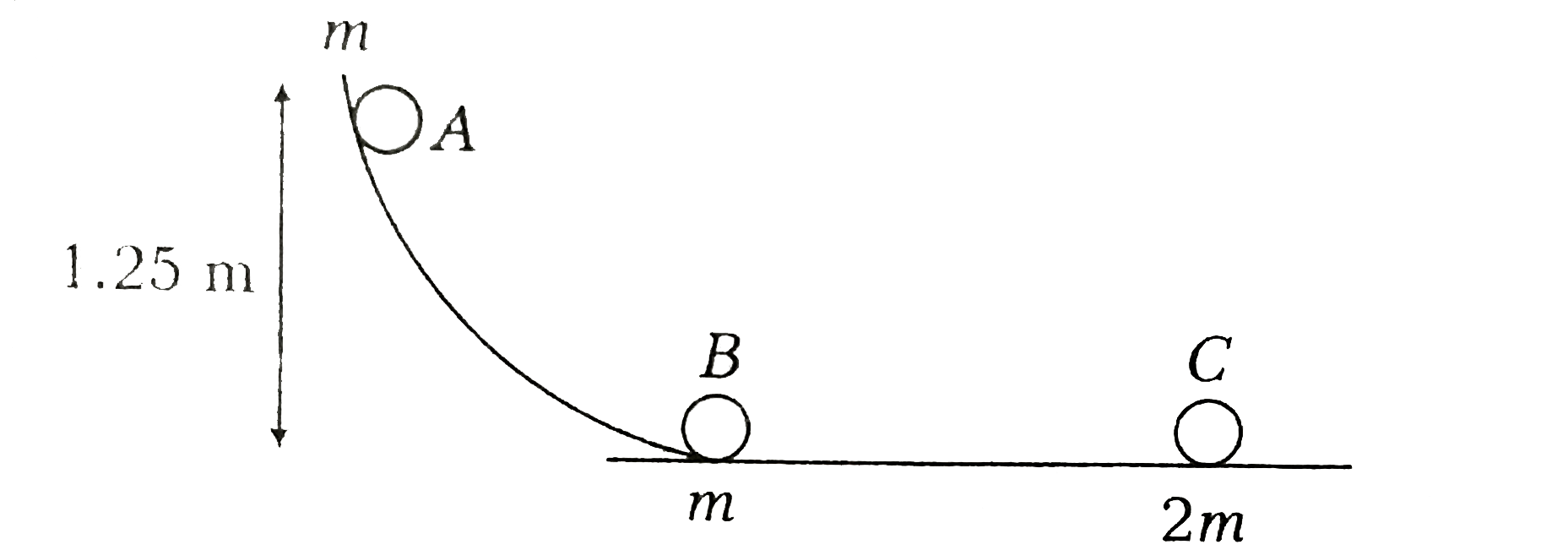
Then, particles A and B together collide elastically with particle G of mass 2m at rest. The speed of particle G after the collision with combined body (A+B) would be (Take, g`=10 ms^(-2))`03:17View SolutionA pendulum consists of a wooden bob of mass `m` and length `l`. A bullet of mass `m_(1)` is fired towards the pendulum with a speed `v_(1)`. The bullet emerges out of the bob with a speed of `(v_(1))//3` and the bob just completes motion along a vertical circle, then `v_(1)` is
09:45View SolutionTwo blocks of mass m and 2m are kept on a smooth horizontal surface. Theya are connected by an ideal spring of force constant k. Initially the spring is unstretched. A constant force is applied to the heavier block in the direction shown in figure. Suppose at time t displacement of smaller block is `x_(1)` then displacement of the heavier block at this moment would be
 03:58View Solution
03:58View SolutionThree identical blocks A, B and C are placed on horizontal frictionless surface. The blocks B and C are at rest. But A is approaching towards B with a speed of `10 ms^(-1)`

The coefficient of restitution for all collision is 0.5. The speed of the block C just after collision is04:30View SolutionYou are supplied with three identical rods of same length and mass. If the length of each rod is `2pi`. Two of them are converted into rings and then placed over the third rod as shown in figure. If point A is considered as origin of the coordinate system the coordinate of the center of mass will be (you may assume AB as x-axis of the coordinate system).
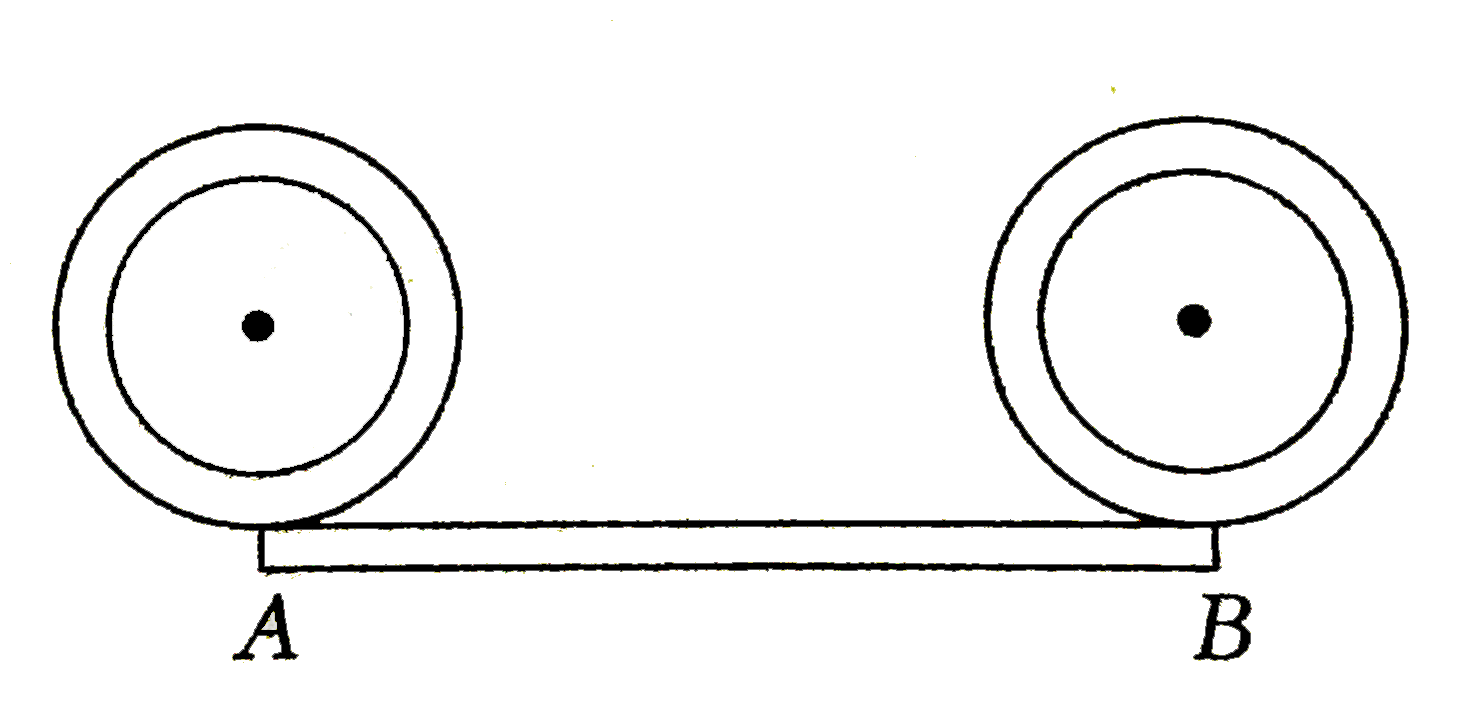 03:47View Solution
03:47View SolutionAn object comprises of a uniform ring of radius `R` and its uniform chord `AB` (not necessarily made of the same material) as shown. Which of the following can not be the centre of mass of object
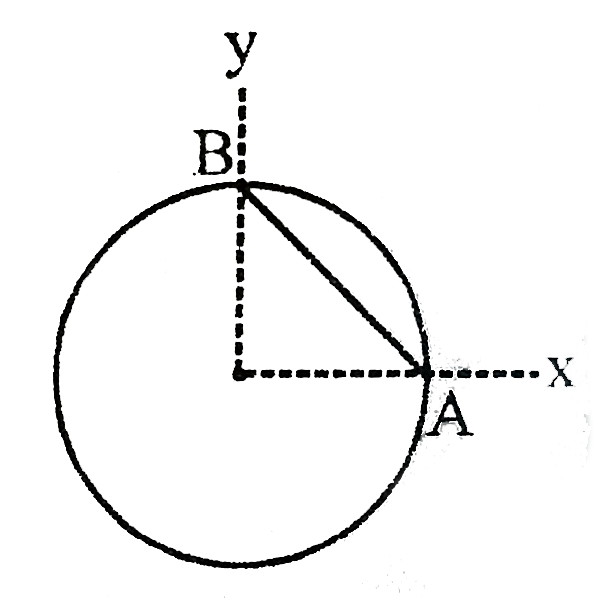 03:34View Solution
03:34View SolutionA uniform circular disc of radius a is taken. A circular portion of radius b has been removed from it as shown in the figure. If the center of hole is at a distance c from the center of the disc, the distance `x_(2)` of the center of mass of the remaining part from the initial center of mass O is given by
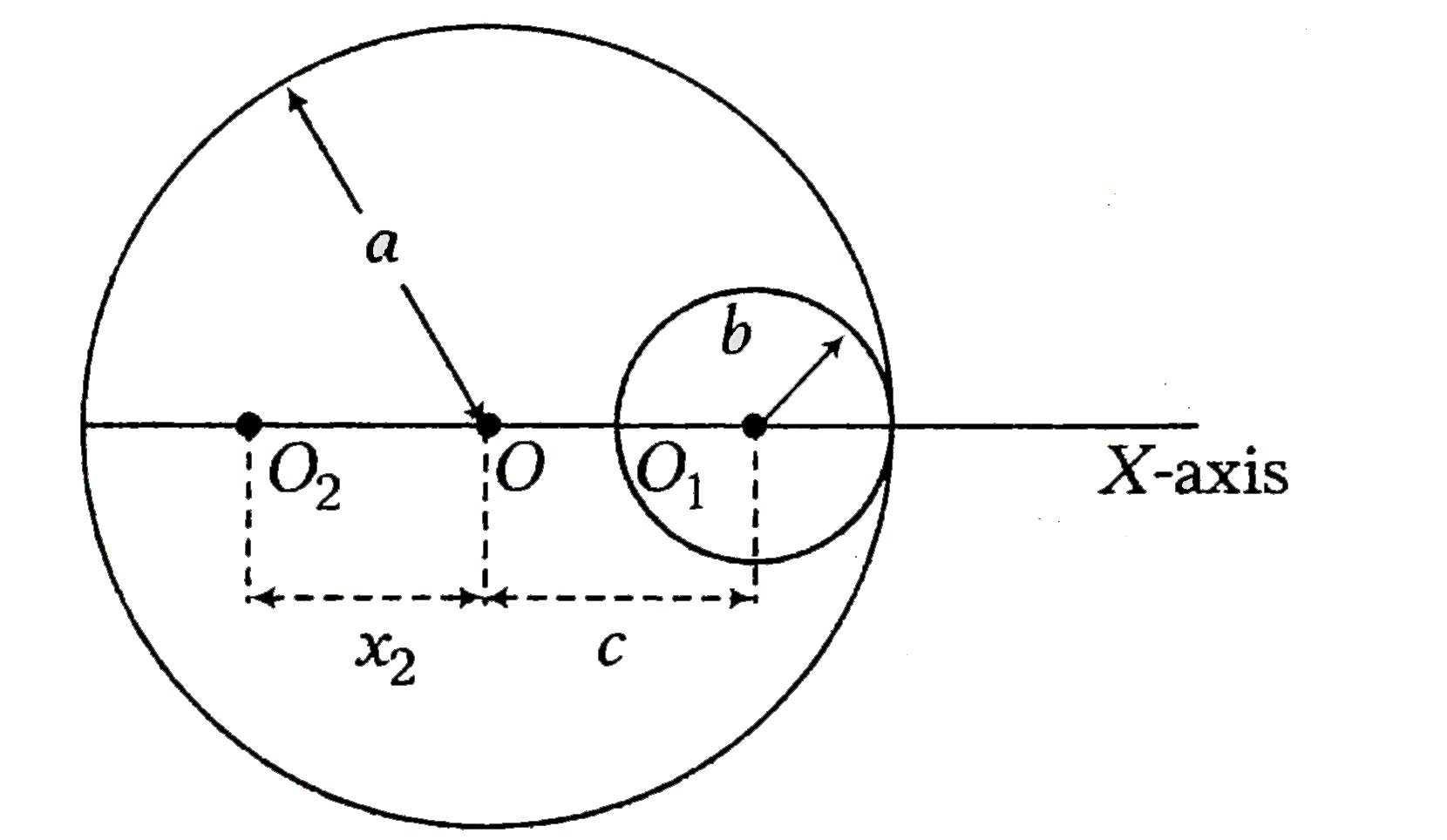 04:53View Solution
04:53View SolutionFrom a circular disc of radius R, a square is cut out with a radius as its diagonal. The center of mass of remaining portion is at a distance from the center)
05:54View SolutionA partical falls from a height `h` upon a fixed horizontal plane and rebounds. If `e` is the coefficient of restitution, the total distance travelled before rebounding has stopped is
02:42View SolutionA train of mass M is moving on a circular track of radius R with constant speed `v`. The length of the train is half of the perimeter of the track. The linear momentum of the train will be
06:47View SolutionA block A of mass M moving with speed u collides elastically with block B of mass m which is connected to block C of mass m with a spring.

When the compression in spring is maximum, the velocity of block C with respect to block A is (Neglect the friction everywhere)View Solution`n` elastic balls are placed at rest on a smooth horizontal plane which is circular at the ends with radius `r` as shown in the figure. The masses of the balls are `m`, `m/2`, `m/2^2`, …………….`(m)/(2^(n-1))` respectively. What is the minimum velocity which should be imparted to the first ball of mass `m` such that `n^th` ball completes the vertical circle
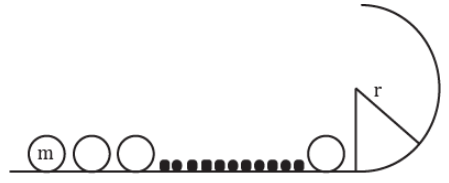 05:48View Solution
05:48View SolutionA small ball rolls off the top landing of a staircase. It strikes the mid point of the first step and then mid point of the second step. The steps are smooth & identical in height & width. The coefficient of restitution between the ball & the first step is :
04:12View SolutionA girl throws a ball with an initial velocity v at an angle `45^@`. The ball strikes a smooth vertical wall at a horizontal distance d from the girl and after rebound returns to her hands. What is the coefficient of restitution between wall and ball ? `(v^2 gt dg)`
07:15View Solution
Taking it together questions and complete solutions for chapter CENTRE OF MASS of DC PANDEY PHYSICS (HINGLISH) of Class 11
